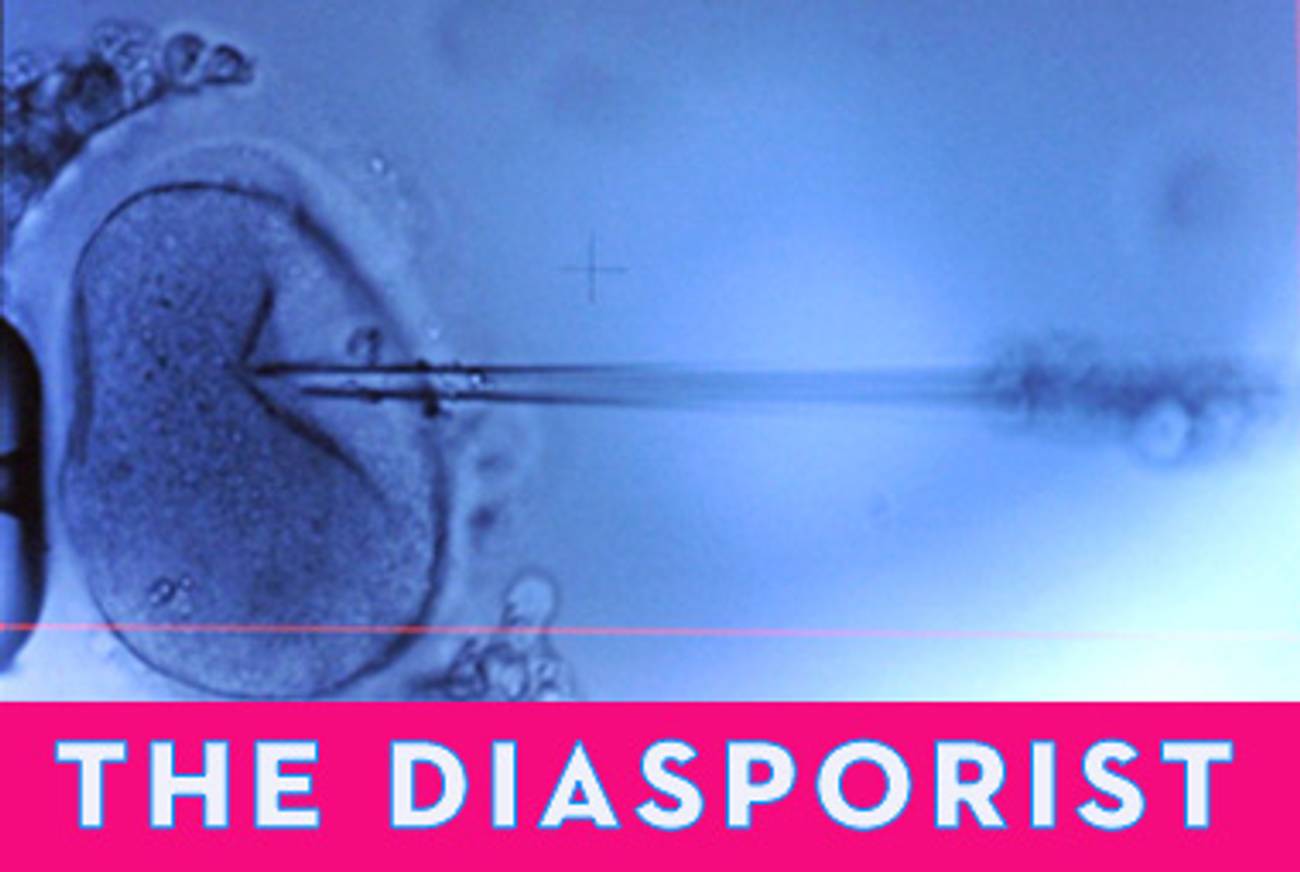Made in Heaven
Israel has enthusiastically embraced advanced reproductive technologies. Now a court is considering whether parents have the right to use their dead son’s frozen sperm to create posthumous grandchildren.




Last fall, 27-year-old Ohad Ben-Yaakov was injured in an accident at his part-time job, and he died after two weeks in a coma. Ben-Yaakov wasn’t married, nor was he in a relationship. No woman was pregnant with his child. Nevertheless, his devastated parents believe it’s not too late for them to become the grandparents of his offspring. And because they live in Israel, the world capital of in-vitro fertilization and a country that regularly pushes the envelope on reproductive technologies, they might get their wish.
When Mali and Dudi Ben-Yaakov learned their son was brain dead, they had his sperm extracted. Now they’re awaiting the decision of Israel’s attorney general on whether they’ll be permitted to find a woman to bear their grandchild. “If we were entitled to donate the organs of our son why are we not entitled to make use of his sperm in order to bring offspring to the world?” they asked in Haaretz.
If their petition succeeds, it will be the latest legal and cultural innovation in a country that has already embraced the idea of posthumous parenthood and come closer than any other to acknowledging a right to grandparenthood. It’s not surprising that Israel, a society that is at once rooted in ancient faith and deeply invested in cutting-edge technology, has pioneered futuristic forms of procreation. The biblical emphasis on fruitfulness, when compounded by the legacy of the Holocaust and the demographic issues shaping the Middle East, have made Israeli society and public policy exceptionally pro-natalist. The country is aggressive in pushing the boundaries of reproductive technology. It has the world’s highest IVF rate: According to a 2006 paper prepared for the Knesset, 1,800 treatment cycles are performed each year per million people, compared to 240 in the United States. Its specialists are among the best on earth, and health insurance there covers unlimited IVF attempts, up to the birth of two live children. Israel was the first country in the world to legalize surrogate-mother agreements.
Meanwhile, in a country where almost every family sees its children join the military, there’s a hunger for anything that might salve the anguish of losing a son or daughter. Posthumous reproduction can seem like one more weapon in the ancient Jewish struggle for ongoing existence. As Irit Rosenblum, the feminist lawyer representing the Ben-Yaakov family, says, “It’s an idea of continuation. It’s a dream. Magic.”
Some feminists and scholars, though, are troubled by Israel’s culture of boundary-pushing reproductive technology. Quite aside from the issue of postmortem fatherhood, the combination of state subsidies and intense pressure to have children can lead infertile Israeli women to endure many more IVF attempts than they might elsewhere. Whereas women in the United States might undergo several cycles, says Wendy Chavkin, a professor at Columbia University’s Mailman School of Public Health, “Israel is the only place I know of where people can have 17,” although no one knows the long-term effects of such treatment on a woman’s body.
Then there’s the psychological toll. “It used to be, God forbid you were infertile, it was sad and terrible and tragic, but you came to terms with it,” says Susan Martha Kahn, a Harvard anthropologist and author of Reproducing Jews: A Cultural Account of Assisted Conception in Israel. “Now you can never come to terms with it. There’s no resolution. Some of these women go through round after round, 12, 15 rounds of IVF, and it doesn’t work. That is the eclipse of an entire young life spent trying to get pregnant.”
Creating children from the sperm of the dead adds further philosophical complexity to the tangle of issues around IVF. When must tragedy be accepted instead of combated with the full arsenal of our technology? Who gets to decide? “Where we are with reproductive technologies is a result of the fact that we have refused to accept infertility as a fact,” says Vardit Ravitsky, an Israeli-born assistant professor in the Bioethics Programs at the Université de Montréal Faculty of Medicine. “Today, the idea that I have a right to have a genetic child is much more accepted than in the past. To extend that one generation to genetic grandchildren maybe is not that farfetched.”
Ravitsky was a participant in the Israeli Ministry of Justice discussions that led to the country’s guidelines on posthumous reproduction, issued in 2003. Those guidelines were notable for allowing a dead man’s wife or partner to access his sperm as long as he didn’t leave explicit instructions to the contrary. “This notion of presumed consent, that we can assume that a man would want to have genetic children after his death, that was really pushing the envelope at the time in comparison with other countries,” says Ravitsky. But the ministry refused to allow a man’s mother or father similar access, concluding that parents have no legal standing regarding their children’s fertility, “[n]ot in their lifetime, and certainly not when they are dead.”
For years, Rosenblum, the Ben-Yaakovs’ lawyer, has been fighting to give bereaved parents the power that the guidelines denied them. In 2001, she campaigned for the army to adopt what she called a biological will, offering soldiers the option of freezing their sperm or eggs in order to see their lineage continue in the event of their death. Though the army rejected the idea, it received media attention. Then, one night the following year, Rosenblum got a phone call from a hysterical woman. Her son, 19-year-old Keivan Cohen, had just been killed by a sniper in Gaza. His mother wanted the hospital to save his sperm, which can survive for 72 hours after death. She’d read about Rosenblum and begged for her help. Rosenblum rushed to file an affidavit and succeeded in having the boy’s sperm extracted.
Through a newspaper ad, Cohen’s parents found a woman who was planning on becoming a single mother and who liked the ideas of using a known donor and also of ensuring that her baby would have supportive grandparents. But with no written instructions from Cohen, the hospital where his sperm was stored refused to release it. A long legal battle ensued, until, in 2007, a Tel Aviv court ruled in his family’s favor.
So far, the potential mother’s IVF treatments have not been successful, though attempts are ongoing. But Rosenblum retains an almost giddy faith in the ability of technology to triumph over cruelties of nature and fate. Speaking of Cohen’s mother, she says, “No psychiatrist can help this kind of a woman to recover from the loss of her son. But this is giving a new hope. It’s unbelievable. It brings her back to life.”
Of course, there’s something unsettling in this desire to create a child to compensate for the loss of another. Many of our earliest and our most enduring myths warn against the hubristic human desire to transcend the forces of life and death. On a practical level, if posthumous reproduction and a right to grandparenthood become common, they could create intolerable pressure on surviving partners, who might feel obliged to bear a dead man’s children rather than start a new life with a new husband or boyfriend. There’s already been one case, says Ravitsky, in which the partner and parents of a deceased man went together to access his sperm and “the medical team had the impression that the young woman was being pressured.” The woman eventually decided not to go through with it, but others might not be strong enough to say no, whatever their own doubts.
At the same time, new reproductive innovations always have a sinister sci-fi air at first, until they’re folded into everyday life. A 1974 Chicago Tribune article about what were then called test-tube babies asked, “Is 1984 already here?” and suggested that the technology could lead to the “creation of a slave race.” These days, IVF and other assisted reproductive technologies are routine and unremarkable. Few find it shocking when single women seek sperm donors to parent alone. If the babies born to such women have two sets of grandparents to welcome them into the world, that would make their lives more traditional rather than less.
Ravitsky says she’s troubled by the idea of a society in which “whenever a young man loses his life in his 20s, the expectation is that his parents will use his sperm to create genetic grandchildren.” But she also sees cases where the interests of would-be single mothers and of heartsick parents align. During the discussion leading to the Ministry of Justice guidelines, people who’d lost their children came forward to plead for the right to grandparenthood. “I remember really being struck by an elderly father who lost his son in the army, who spoke before the committee with tears in his eyes and talked about what it would mean to him to have grandchildren, and the grief he had about the fact that at the time his son died, the technique wasn’t there to extract sperm,” Ravitsky says. “I remember thinking we should think outside the box here. It’s too simple to just say no.”
Michelle Goldberg is a senior contributing writer at The Nation. She is the author, most recently, of The Goddess Pose: The Audacious Life of Indra Devi, the Woman Who Helped Bring Yoga to the West. Her Twitter feed is @michelleinbklyn.
Michelle Goldberg is a senior contributing writer at The Nation. She is the author, most recently, of The Goddess Pose: The Audacious Life of Indra Devi, the Woman Who Helped Bring Yoga to the West. Her Twitter feed is @michelleinbklyn.